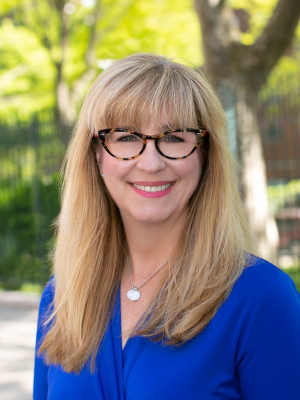 “My definition of success has shifted,” says Natalie Runyon. “Fifteen years ago, I wanted to be in the C-suite. Now, my biggest legacy is raising well-adjusted children and having a good partnership to do that.”
“My definition of success has shifted,” says Natalie Runyon. “Fifteen years ago, I wanted to be in the C-suite. Now, my biggest legacy is raising well-adjusted children and having a good partnership to do that.”
First profiled in 2013 while Director of Global Security at Thomson Reuters, Runyon reflects on how her mindset of continual evolution has shaped her approach to achievement, purpose, and impact. She speaks to how she has embraced change with intention, guided by adaptability, self-awareness, and a commitment to aligning her professional growth with her personal values.
Evolving Through Curiosity and Change
Early in her career, Runyon made a name for herself in security operations, first at Goldman Sachs and later at Thomson Reuters, where she managed critical operations around the clock. At the same time, Runyon was already thinking about the future, getting involved with the company’s women’s network, earning a coaching certification, and launching a workshop called Be the CEO of Your Career, which eventually reached more than 1,300 employees globally.
“Be the CEO of Your Career was translated into Spanish and Portuguese, and I trained facilitators to lead it. It helped get my name out there, build my credibility and expand my network.”
That visibility opened the door to a lateral move into sales operations, a role that allowed her to transition out of security and take on new challenges, but with more regular hours. “It was a big relief,” she says. “By then, I had two young kids, and I needed a shift.”
After a few years in sales, Runyon made her next career leap to a position at the Thomson Reuters Institute, where she has spent the last seven years curating thought leadership on topics ranging from talent and inclusion to ESG, human rights, and AI in the courts. While the content areas have shifted over time, one thing has remained constant: her ability to dive into unfamiliar territory with confidence.
“One consistent thread throughout my career, and why I have been able to make such big moves, is that I’m very comfortable operating in ambiguity and understanding how to ask the right questions to leverage the collective expertise of the people around me.”
In addition to being comfortable with uncertainty, Runyon highlights her natural curiosity as a strength. When she was asked to lead the Institute’s coverage of ESG, she got two ESG certifications to build her credibility and experience, “it opened up a new area for me to sink my teeth into and learn something new.”
That same curiosity is now guiding her latest area of focus: AI governance in court systems. “It’s not something I ever thought I’d be working on,” she says, “but I love that my role continues to evolve. Even though my title hasn’t changed, the content keeps shifting, and that keeps it interesting.”
Reframing Success and Failure
Runyon’s career evolution has also been shaped by her willingness to take risks outside the corporate world. She reflects on how her experiences as an entrepreneur, first in launching a coaching business, and later in acquiring a small company, shaped her definition of success and failure.
“Even though I originally designed the Be the CEO of Your Career workshop for my own coaching business, I probably had more impact rolling it out at Thomson Reuters than I ever would have had as a solo coach,” she says. “That was a success, just not the one I originally pictured.”
Years later, she challenged herself again by buying a business, after investing significant time in learning how to value and grow companies. However, when a family matter demanded her focus, she made the decision to sell. “I sold it at a loss, and financially it was rough,” she says, “but I don’t regret that decision at all.”
Through it all, Runyon has reframed what success looks like. “I don’t really look at things as failures, I look at them as learning opportunities,” she explains. “Life is fluid. None of my plans have ever worked out exactly the way I thought they would, but life has worked out.”
For Runyon, evolution is not about a perfect outcome. It’s about continuing to ask herself the hard questions, adapt, and stay open to wherever growth leads next.
The Dual Impact of Leadership Coaching
With a background in leadership coaching, it is no surprise that Runyon is a firm believer in its transformative impact. She often draws on what she learned during her training, skills that continue to influence how she leads, communicates, and navigates challenges at work.
“From the ability to ask good questions when I’m interviewing somebody for an article to having a level of comfort in asking the hard questions and not being afraid of the answers, my training as a coach has impacted me in foundational ways.”
She continues, “that includes not letting fear drive decision making, because in coaching you learn how to look at the worst-case scenario and explore questions like, ‘how bad can it really be? What if that happens? What can you do about it?’ That mindset has impacted my ability to adapt and flex and pivot.” Additionally, Runyon points to emotional intelligence, self-awareness, and the ability to see things from multiple perspectives as aspects of coaching that she continues to apply in her day-to-day life.
Runyon is also quick to acknowledge the impact coaching has had on her personally, having experienced its benefits not just as a practitioner, but as a client.
“In 2019, I was completely burnt out between juggling work, young kids, and being on two nonprofit boards. I met with Nicki for coffee, and she saw right away that I was miserable. She coached me for six months and helped me see how my mindset wasn’t serving me. She helped me recognize and assert that ‘no’ is a complete sentence and to give myself space to figure out what I needed next. It was a pivotal moment where coaching was critical.”
Grounded by Growth
As Runyon looks to the future, she acknowledges that her path is still unfolding. “I’m still trying to find my way,” she notes. “I’m challenging myself in new ways to give me clarity.”
Today, her focus is less on chasing traditional career milestones and more on creating lasting impact, especially through her family. “My biggest goal is to raise good human beings,” she emphasizes. “If I can give my kids the learnings I’ve had — to take risks, to not be afraid of failure, to stay true to themselves, then that’s success.”
Outside of work, Runyon continues to pursue growth on her own terms. What started as a personal challenge to swim a mile, a skill she once disliked, has grown into training for a sprint triathlon. “I’m trying to stretch myself, to do hard things, and to keep learning,” she says. She also set a goal two years ago to visit all 50 states by the time she turned 50, a milestone she will complete this summer.
Setting ambitious goals, inside and outside of work, is part of how Runyon continues to evolve. As she puts it, “It’s about progress, not perfection…You’re in charge of your own journey. You’re in charge of your own path. Just live your life.”
By Jessica Robaire

